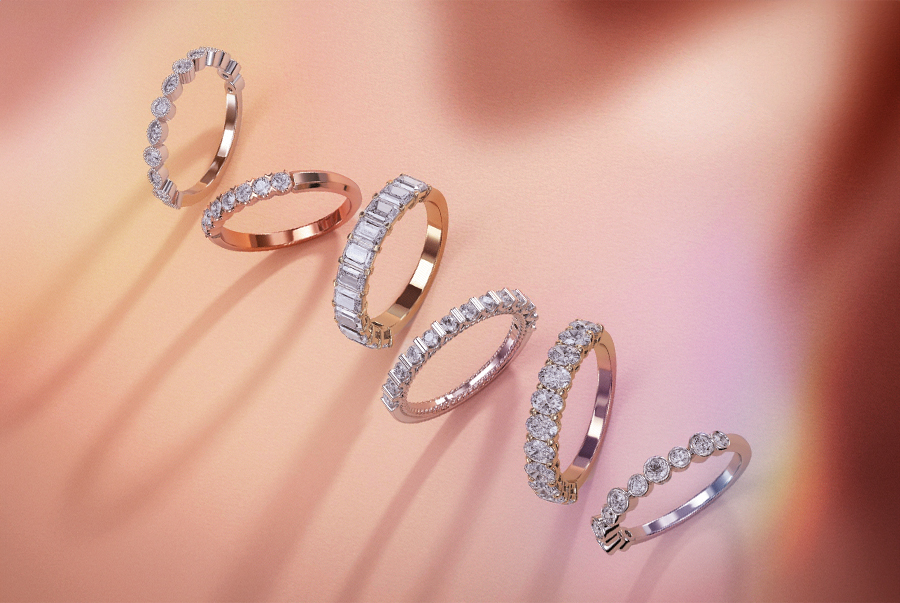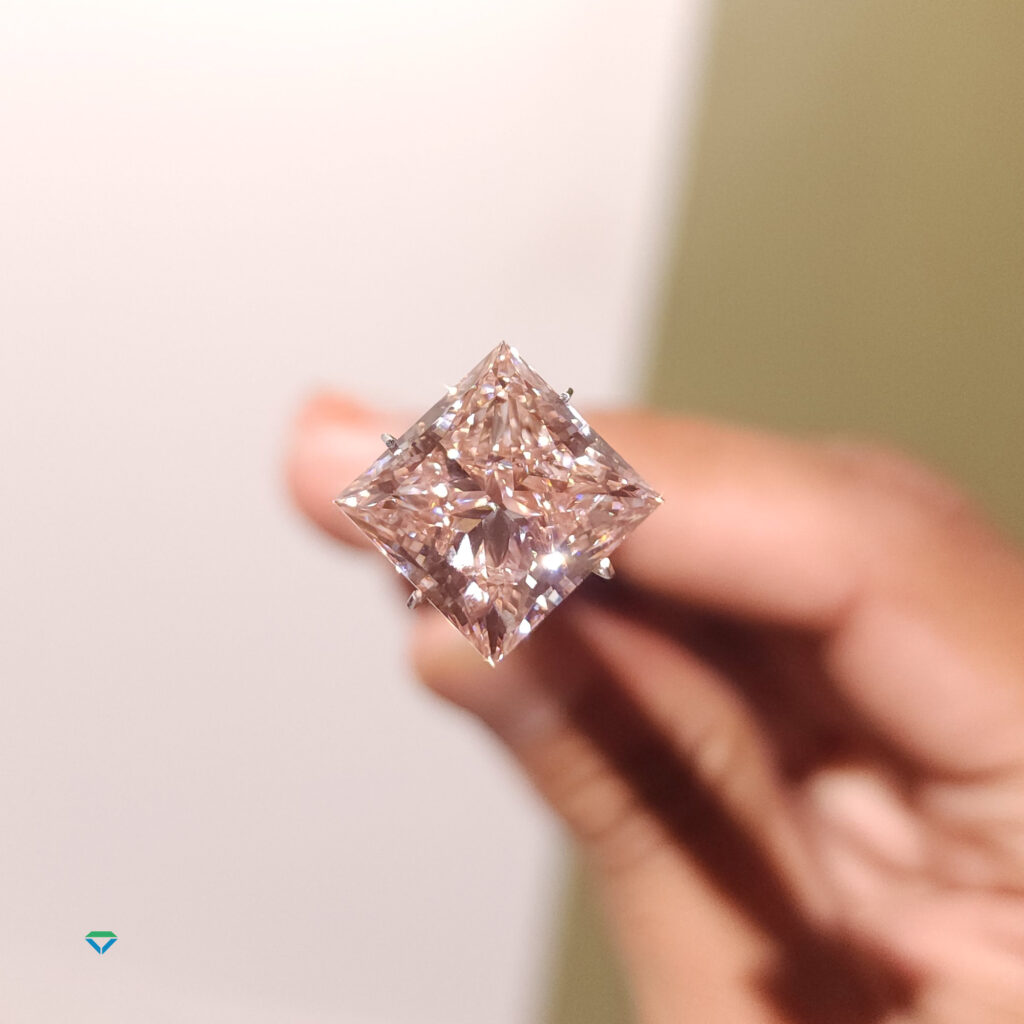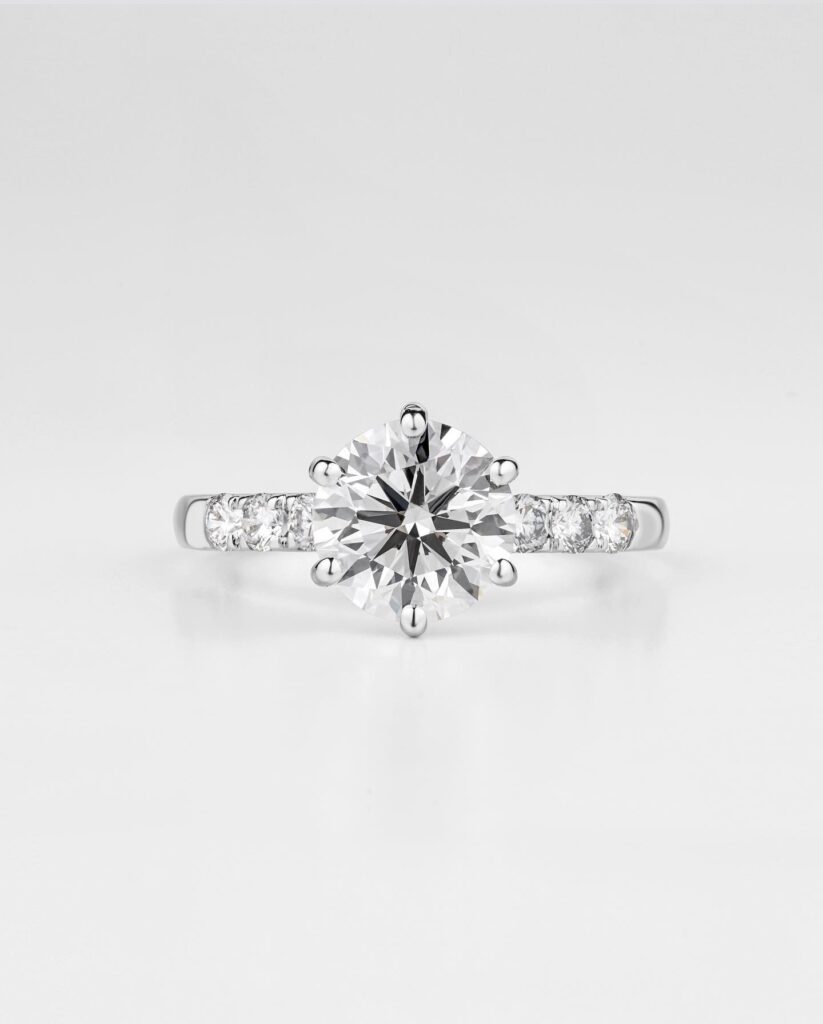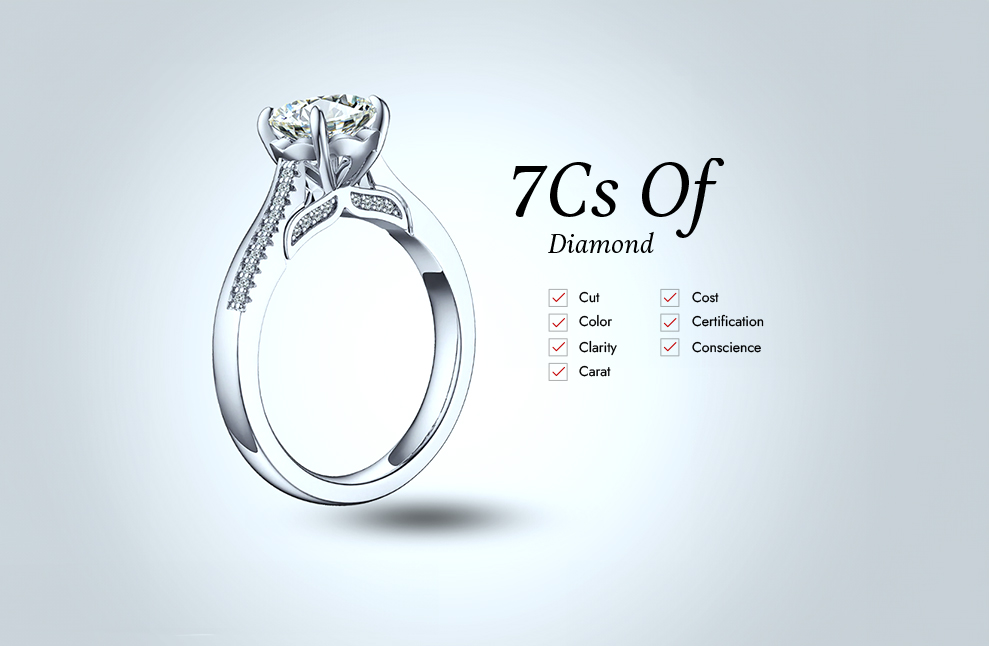7cs of Diamond: Must Know Before Buying an Engagement Ring
Choosing an engagement ring today is about more than just sparkle; it’s about meaning and mindfulness. The 7Cs framework helps you evaluate every aspect of a diamond, from its craftsmanship and quality to its authenticity, value, and ethical origin. To make things simple while shopping, you can remember them with an easy phrase like “Cut, Clarity, Carat, Color, Certification, Cost, and Confidence”, a quick reminder of what truly matters when finding a ring that reflects both beauty and values. Don’t forget to ask these questions to your jeweler before finalizing your engagement ring or any other piece of jewelry. In this blog post, you will learn everything about 7cs and your basic diamond education you should have in mind, so you can shop like a pro.
These seven elements guide you through the technical and ethical side of diamond buying, helping you find a ring that’s both breathtaking and responsibly made. Whether you’re exploring lab-grown diamonds for their sustainability or searching for a timeless design, understanding these 7Cs ensures your engagement ring truly represents your love story.
The 7Cs of Diamond Explained

1. Cut: Unveiling the Art Behind the Sparkle
The cut of a diamond is often considered the most crucial factor in determining its sparkle and brilliance. It refers to how well the diamond has been shaped and polished, revealing the artistry behind its beauty. A well-cut diamond will have precise angles and proportions, allowing it to reflect and refract light in a way that maximizes its brilliance and symmetry.
A good cut of the diamond will exhibit excellent light reflection and dispersion, creating the mesmerizing sparkle that diamonds are known for. On the other hand, a poorly cut diamond may lose light through the bottom or sides, resulting in a lackluster appearance. An ideal cut diamond is cut to specific proportions that optimize its light performance, creating a stunning and eye-catching sparkle. When selecting a diamond for your unique engagement ring, it is essential to choose one with a good or ideal cut to ensure its maximum beauty and brilliance.
Diamonds graded as Excellent or Ideal Cut radiate unmatched sparkle, while a Poor Cut may appear dull. If you’re investing in a diamond that stands out even in soft lighting, prioritize cut over size.
2. Color: Decoding the Spectrum for Brilliance
The color of a diamond is another significant aspect to consider when selecting a unique engagement ring. While white diamonds and emerald diamonds are the most popular choices, diamonds can come in a range of colors, including yellow, blue, pink, and more. The color of a diamond is graded on a scale from D (colorless) to Z (light yellow or brown). When discussing the 7Cs with your jeweler before buying a diamond, it’s important to ask specific questions about color. Consider asking how the diamond’s color grade might affect its brilliance, whether there are visible differences at certain grades, and which color options best match your preferences and budget. You may also want to inquire about how lighting can influence a diamond’s appearance and whether any treatments have been used to alter its color.
A diamond with less diamond colour (closer to colorless) is considered more valuable and desirable. Completely colorless diamonds are rare and command higher prices. The presence of even a hint of yellow or brown can affect the overall look and light dispersion of the diamond. However, diamonds graded within the D-H range are often indistinguishable to the naked eye, making them an excellent choice for those seeking a balance between quality and affordability.
For the adventurous, fancy color diamonds, like pink, yellow, or champagne, add personality and vibrance to a custom engagement ring.
3. Clarity: Seeing Through the Inclusions
Clarity is an essential factor in determining the quality and value of a diamond. It refers to the presence of imperfections or blemishes within the diamond. Most diamonds have some level of imperfections, as they are formed deep underground under intense pressure and heat, achieving a perfect balance between beauty and durability.
Diamond clarity is graded on a scale ranging from Flawless/Internally Flawless (no visible imperfections under 10x magnification) to Included (visible imperfections to the naked eye). The level of imperfections within a diamond affects its clarity grade and ultimately its value, including instances of poor cut diamonds. However, many imperfections are not visible to the naked eye and do not affect the overall beauty of the diamond.
Most inclusions are invisible to the naked eye, so clarity often becomes a space for smart saving. Opting for VS1 or SI1 clarity can give you a flawless look without overpaying.
4. Carat: Understanding the Weight of Love
The carat weight of a diamond refers to its weight, not its physical size. One carat is equal to 0.2 grams, and the carat weight is used as a measuring scale for diamonds, which indicates a diamond’s weight. The higher the carat weight, the larger the diamond.
When selecting a diamond for your unique engagement ring, it is essential to consider the carat weight, or weight of the diamond, in relation to your personal preferences and budget. While a larger carat weight may be desired for its impressive size, it is important to also consider the other Cs, such as cut, color, and clarity. A well-cut diamond with excellent sparkle and brilliance can appear larger than a poorly cut diamond of the same carat weight. Therefore, finding the right balance between carat weight and overall quality is key to selecting the perfect diamond for your unique engagement ring.
An Ideal Cut 0.9-carat diamond can shine brighter and look larger than a poorly cut 1-carat stone. Balance carat weight with the other Cs to maximize value and visual impact.
5. Certification: Guaranteeing Your Gem’s Authenticity
When purchasing a diamond for your engagement ring, it is important to ensure its authenticity and diamond cut value. Diamond certification provides vital information about the diamond’s quality, characteristics, and origins. It guarantees that the diamond has been independently evaluated and graded by a recognized laboratory.
One of the most reputable and widely recognized diamond grading laboratories is the Gemological Institute of America (GIA). A diamond certified by the GIA comes with a detailed certificate that includes information about the diamond’s cut, color, clarity, diamond carat weight, and other important factors. This certification provides assurance and peace of mind, ensuring that your diamond is genuine and accurately represented.
When selecting a diamond shape for your unique engagement ring, look for diamonds that come with a certification from a recognized laboratory. The certification adds value to your diamond and serves as proof of its quality and authenticity.
A diamond certificate is proof of authenticity and quality. It verifies details like cut, color, clarity, and carat. Always choose diamonds certified by trusted institutions like GIA, IGI, or GCAL.
6. Cost: Budgeting for Your Forever Stone
Cost is an important consideration when purchasing a diamond for your engagement ring. Your diamond’s cost is influenced by all six other Cs. Prioritize what matters most. Each of these factors contributes to the overall value and beauty of larger diamonds.
When setting a budget for your unique engagement ring, it is important to prioritize the Cs that are most important to you. For example, if size is a priority, you may choose a diamond with a larger carat weight but a lower color or clarity grade. On the other hand, if quality, rarity, and an excellent cut are your focus, you may opt for a smaller diamond with higher color and clarity grades.
7. Conscience: Nature Friendly Choice
Many people now prioritize ethical considerations in their purchasing decisions, including the sourcing of their diamonds, to ensure the quality of a diamond is maintained. The diamond industry has made significant strides in ensuring diamonds are free from association with conflict or “blood” diamonds.
The Kimberley Process Certification Scheme is an international initiative that aims to prevent the trade of conflict diamonds and promote responsible sourcing, ensuring that diamonds adhere to the stone’s technical characteristics. It requires participating countries to implement strict regulations and certification processes to ensure that diamonds are purchased legitimately and ethically.
When selecting a diamond for your unique engagement ring, choosing diamonds that adhere to the Kimberley Process rules assures that your diamond is not linked to conflict diamonds. By choosing ethically sourced diamonds, you can trust that your diamond purchase also aligns with our terms of your privacy policy, as ethical sourcing ensures that your diamond is responsibly mined and traded, minimizing the negative environmental and social impacts associated with diamond mining.
Beyond the 7Cs: Shape and Style Matter Too

When you think of buying a diamond, you often hear about the 7Cs: Cut, Color, Clarity, Carat, Certification, Cost, and Conscience. These are important, but there’s one more factor that truly defines your diamond, its shape.
The shape is the first thing you notice when you look at a diamond. It gives the stone its personality and character, reflecting your style. Before you even think about the technical details, your eyes are drawn to the outline, whether it’s round, oval, or square. Rather than the common shapes, many people nowadays select antique cut diamonds, like old mine cut, old European cut, or other custom cut diamonds.
Each diamond shape tells its own story:
- Round Brilliant: The most classic and timeless choice, known for maximum sparkle.
- Oval: Elegant and elongated, often chosen for its soft, romantic appeal.
- Princess Cut: Modern and bold, with sharp lines and a lot of brilliance.
- Cushion Cut: Soft and vintage-inspired, offering a warm, glowing sparkle.
- Marquise: Distinctive and dramatic, creating the illusion of longer fingers.
- Pear Shape: A mix of classic and artistic, symbolizing individuality.
- Emerald Cut: Sleek and sophisticated, known for its mirror-like reflections.
Your diamond’s shape also affects:
- How it sparkles: Each shape reflects light differently.
- How big it looks: Some shapes, like oval or marquise, appear larger for the same carat weight.
- How it fits your hand: Certain shapes complement specific hand types or ring settings.
Choosing a shape isn’t just about beauty; it’s about connection. The right shape feels like “you.” It reflects your story, your taste, and your personality.
When you take the time to explore different diamond shapes, you’re not just buying a stone; you’re finding the one that truly fits your story.
Why Lab Grown Diamonds Are the Future of Fine Jewelry?
While traditional diamonds, including pear shapes, are a popular choice for engagement rings, there are innovative options to consider when selecting a unique diamond. Lab-grown diamonds are a sustainable and ethical alternative to mined diamonds.
These diamonds are created in a laboratory using advanced technology that replicates the natural diamond formation process. Lab-grown diamonds have the same physical, chemical, and optical properties as natural diamonds but are more affordable, often available at a fraction of the price, and environmentally friendly.
They are free from the ethical concerns associated with traditional diamond mining and offer a high-quality alternative. By embracing lab-grown diamonds, you can make a conscious and ethical choice while still enjoying the beauty and brilliance of a diamond in your unique engagement ring.
Benefits of Choosing Lab Grown Diamonds for Your Engagement Ring

You can still have an attractive and flashy look for your diamond engagement ring with your inexpensive amount. You can still give your partner an engagement ring they love because we understand their choice will be a priority for you. You can buy lab created diamonds, including colourless diamonds, that are bigger than their natural counterpart and have the same or better clarity and brilliance within an affordable budget. If she likes simple designs of an engagement ring, try the Lab Grown Solitaire Diamond Engagement Ring, which is elegant and yet gives a richer look.
You know that the most interesting thing about lab created diamonds is that they are eco-friendly. These man-made diamonds are cultured in the lab without harming Mother Nature. They are not mined, so it is a better option for a person who wants to try an ethical, eco-friendly lab made diamond that also reflects a diamond’s sparkle for their diamond Engagement Ring.
Buying Lab Created Diamonds or Natural Diamonds
Only choosing the design and cost of this “2 Cs” is not enough; you also have to consider other “5 Cs,” namely Cut, Color, Clarity, Carat, and Certification of a diamond. When it comes to buying diamond jewellery, whether it is a lab-created or natural diamond, you need to give importance to these parameters of a diamond as they influence the value and luster of the diamond. An engagement ring is a really special piece of jewelry that you are going to wear throughout your life. You need to invest your money to buy a special lab-cultured diamond ring, which is perfect and loved by your partner, and the diamond price doesn’t burn a hole in your pocket.
FAQs:
How Do I Verify the Certification of a Diamond?
Verifying the certification of a diamond is crucial to ensure its authenticity and value. When buying a diamond, make sure it has been certified by a recognized laboratory, such as GIA (Gemological Institute of America) or IGI (International Gemological Institute). A diamond certificate provides important information about the diamond’s technical characteristics, including its cut, color, clarity, and carat weight. It serves as proof of the diamond’s quality and authenticity and gives you peace of mind knowing that you are investing in a genuine and valuable diamond.
Can Customization Affect the Value of a Diamond?
Customization can affect the value of a diamond, particularly when it comes to creating a unique engagement ring. While customization allows you to create a ring that perfectly reflects your style and preferences, it may involve additional costs. The value of a diamond can be influenced by factors such as the rarity of the stone, the complexity of the design, and the craftsmanship involved, including how the diamond’s grade is evaluated on a colour scale. It is essential to work closely with a reputable jeweler who can advise you on the feasibility and potential impact on the value of your customized diamond engagement ring.
Ethical Considerations: How Important Are They?
Ethical considerations are of utmost importance when buying a diamond. It is essential to support the Kimberley Process, which ensures that diamonds are sourced ethically and are not associated with conflict or human rights abuses. By purchasing a diamond, known for its clarity of a diamond, from a reputable jeweler who adheres to ethical sourcing practices, you can have peace of mind knowing that your diamond is not contributing to any unethical activities. Making an ethically conscious choice aligns with your values and allows you to celebrate your love without compromising your conscience.

